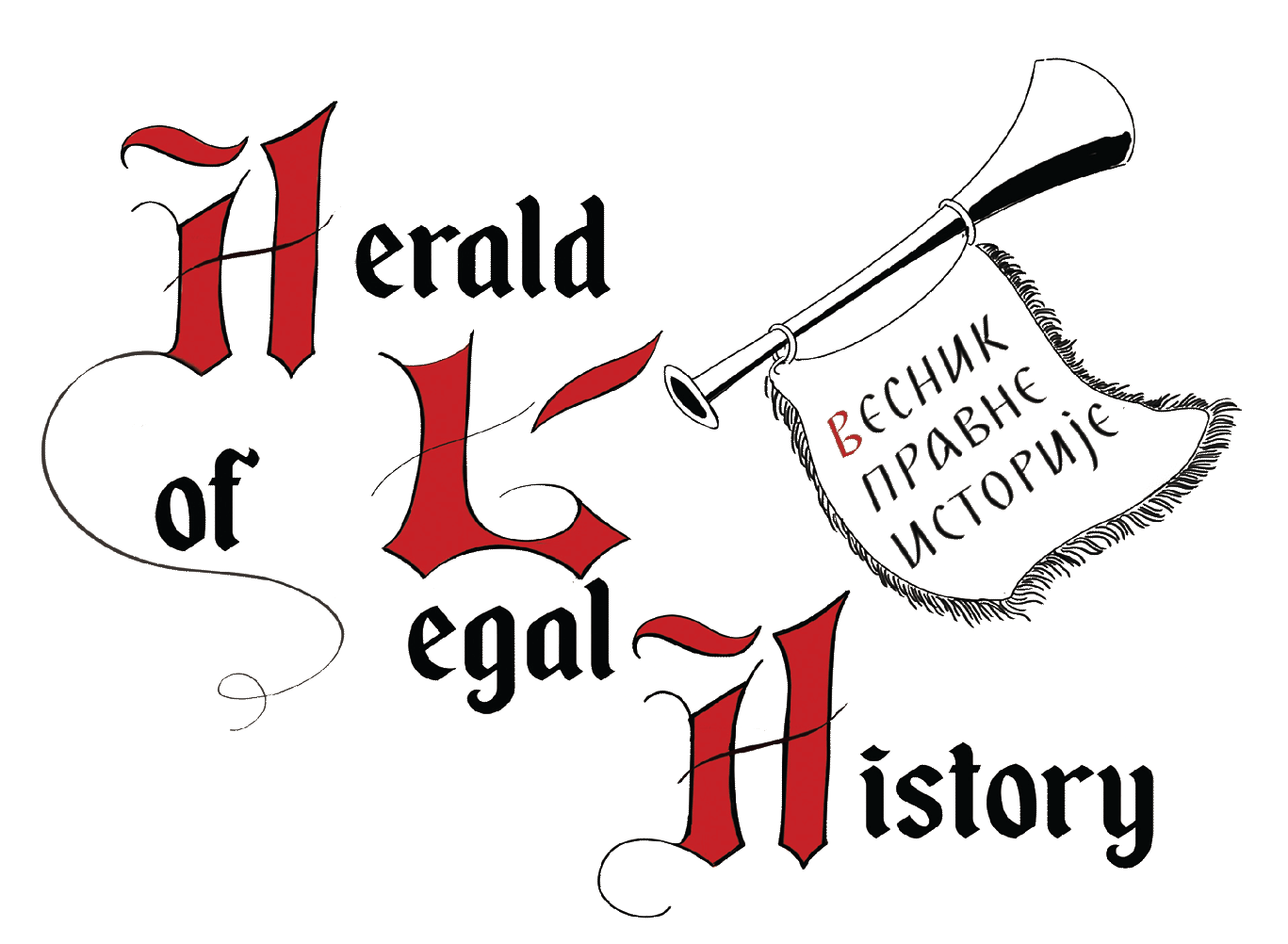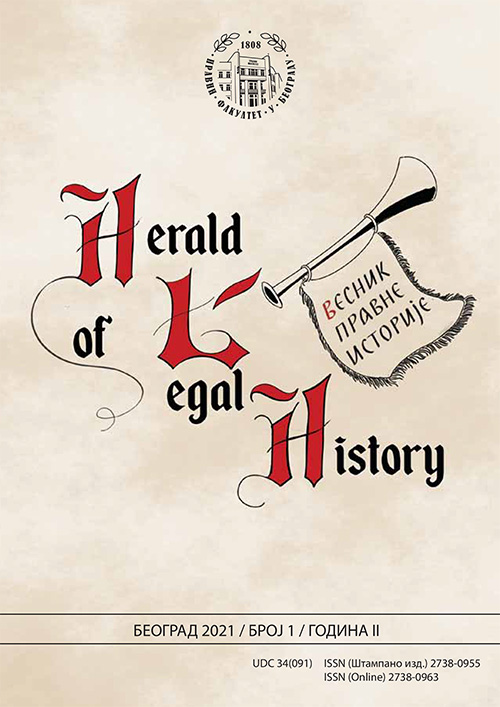THEMIS AND DIKE - JUSTICE IN GREEK MYTH AND TRADITION
Abstract
The understanding of law in Ancient Greece was based on the religious interpretations of human nature and natural laws. Two Greek goddesses were representatives of justice and fairness. In the ancient sources Themis is presented as a goddess and prophetess, one of the Titans and the daughter of Gea and Uranus. She is a symbol of divine order, justice, natural law and good customs. Dike, the daughter of Themis, is the goddess of justice and truth, the protector of rights and courts of justice, the arbiter, the symbol of honor, the goddess of revenge and punishment. In early Greek culture and poetry, the terms themis and dike represented justice in the meaning of cosmic order, natural law, and legality. The paper analyses the Hellenic notions of justice, fairness and legality embodied in the phenomena of themis and dike. Nomos (law) is just only if it is in harmony with themis, and law is valid only if it is just. The paper presents the doctrines of Hellenic writers, poets and playwrights on justice and law, with special reference to the influence of mythology on Hellenic law. Publius Ovidius Naso’s work „Metamorphosis”, which speaks about Themis’ role in the creation of the world and the salvation of the human race is one of the greatest sources about this goddess. In Homer’s „Iliad” and „Odyssey”, epics that sing of the heroic spirit, justice is shown in the motives, intentions and behavior of the participants in the event, mostly heroes. The poet Hesiod, famous for the poems „Theogony” and „Works and Days”, moves away from the heroic virtues of people and portrays the gods as bearers of moral power and guardians of justice. In the light of legislative reforms, Solon’s dike represents the progress and well-being of society through economic reforms, which is why justice and injustice refer only to legal and illegal acquisition of wealth and its effect on the community. Aeschylus’ „Oresteia” shows the principle of justice based on talion, according to which the punishment has to be identical with the committed crime. One of the greatest Ancient Greek playwrights, Sophocles, based his play „Antigone” on the conflict between the laws of men and the laws of gods. According to Herodotus, the greatest Ancient Greek historian, the actions of the gods govern human destinies and historical events. The idea of justice in Ancient Greece was all throughout its transformation based of the universial concept of natural balance.
References
Heraklit, Fragmenti (priredio Miloš Đurić), Grafos, Beograd 1979.
Херодотова историја (превео Милан Арсенић), Дерета, Београд 2018.
Hesiod, Poslovi i dani, Postanak bogova, Homerove himne (preveo Branimir Glavičić), Demetra – Filološka biblioteka Dimitrija Savića, Zagreb 2005.
Hesiod, Theogony, Works and Days, Testimonia (edited and translated by Glenn W. Most), Harvard University Press, Cambridge – London 2006.
Homer, Odiseja (preveo Panajot Papakosopulos), Karpos, Loznica 2013.
Homer, Ilijada (preveo Miloš N. Đurić), Dereta, Beograd 2015.
Publije Ovidije Nason, Metamorfoze (preveo Tomo Maretić), Matica Hrvatska, Zagreb 1907.
Плутарх, Славни ликови антике I (превео Милош Ђурић), Матица српска, Нови Сад 1990.
Софокле, Антигона (превео Милош Н. Ђурић), Завод за уџбенике, Београд 2019.
Sima Avramović, „Gnome dikaiotate – pravo, pravda i pravičnost u atinskoj sudnici”, Jasminka Hasanbegović (ur.), Pravo i pravda 2013, Univerzitet u Beogradu – Pravni fakultet, Beograd 2019, 19–39.
Emily Baragwanath, „History, Ethnography, and Аеtiology in Herodotus’ Lybian Logos”, Histos Supplement 11/2020, 155–188.
John Bertrand Lott, „An Augustan Sculpture of August Justice”, Zeitschrift für Papyrologie und Epigraphik 113(1996), 263–270.
Ан-Мари Битен, Стара Грчка, Clio, Београд 2010.
Коста Чавошки, О правди и правичности, САНУ, Београд 2017.
William Desmond, „Punishments and the Conclusion of Herodotus’ Histories”, Greek, Roman, and Byzantine Studies 44/2004, 19–40.
Matthew W. Dichie, „Dike as a Moral Term in Homer and Hesiod”, Classical Philology 73(2)/1979, 91–101.
Vil Djurant, Istorija civilizacije: Život Grčke, Narodna knjiga, Beograd 1996.
Pamela Donleavy, Ann Shearer, From Ancient Myth to Modern Healing (Themis: Goddess of Heart-Soul, Justice and Reconciliation), Routledge, London – New York 2008.
Miloš Đurić, Istorija helenske etike, BIGZ, Beograd 1976.
Miloš N. Đurić, Istorija helenske književnosti, Zavod za udžbenike i nastavna sredstva, Beograd 1996.
J. Peter Euben, „Justice and the Oresteia”, The American Political Science Review 76(1)/1982, 22–33.
Jane Ellen Harrison, Themis – A Study of the Social Origins of Greek Religion, Cambridge University Press 1912.
Molly Farneth, „Gender and the Ethical Given: Human and Divine Law in Hegel’s Reading of the Antigone”, The Journal of Religious Ethics 41(4)/2013, 643–667.
Nick Fisher, „Popular Morality in Herodotus”, Egbert J. Bakker, Irene J. F. de Jong, Hans van Wees (eds.), Brill’s Companion to Herodotus, Leiden – Boston − KÖln 2002, 199–224.
Michael Gagarin, „Dike in Archaic Greek Thought”, Classical Philology 69(3)/1974, 186–197.
Robert Grevs, Grčki mitovi, Miba books, Beograd 2017.
Dimka Gicheva-Gocheva, „The Influence of Herodotus on the Practical Philosophy of Aristotle”, Labyrinth 18(2)/2016, 104–116.
Eric A. Havelock, The Greek Concept of Justice from Its Shadow in Homer to Its Substance in Plato, Harvard University Press, Cambridge – London 1978.
Jasminka Hasanbegović, „Predgovor”, Jasminka Hasanbegović (ur.), Pravo i pravda 2013, Univerzitet u Beogradu – Pravni fakultet, Beograd 2019, 7–18.
Karl-J. Hölkskamp, „Written Law in Archaic Greece”, Proceedings of the Cambridge Philological Society 38/1992, 87–117.
Željko Kaluđerović, Presokratsko razumevanje pravde, Izdavačka knjižarnica Zorana Stojanovića, Sremski Karlovci – Novi Sad 2013.
Željko Kaluđerović, „Antički koreni savremenih shvatanja pravde”, Glasnik Advokatske komore Vojvodine: časopis za pravnu teoriju i praksu 3/2019, 348–363. H. D. F. Kito, Grci, Prosveta, Beograd 2008.
P. S. Kohan, Istorija stare grčke književnosti, Izdavačko preduzeće „Veselin Masleša”, Sarajevo 1973.
Marek Maciejewski, „The Relationship between Natural and Statutory Law in Ancient and Medieval Concepts”, Księgarnia Akademicka, Politeja 48/2017, 5–22.
Miroslav Marković, Studije o religiji antike, Jasen, Nikšić 2001.
Jon D. Mikalson, „Religion in Herodotus”, Egbert J. Bakker, Irene J. F. de Jong, Hans van Wees (eds.), Brill’s Companion to Herodotus, Leiden – Boston − KÖln 2002, 187–198.
Gerasimos Santas, „Plato on Inequalities, Justice and Democracy”, Georgios Anagnostopoulos, Gerasimos Santas (ed.), Democracy, Justice, and Equality in Ancient Greece: Historical and Philosophical Perspectives, Philosophical Studies Series vol. 132, 161–178.
Mirjana Stefanovski, Kosta Čavoški, Apsolutna i ublažena pravda u Eshilovoj Orestiji, Naš dom, Beograd 2001.
Stefan Weinstock, Divus Julius, Oxford University Press, London 1971.





